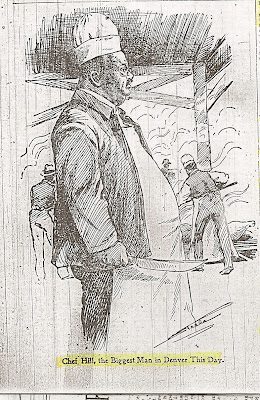I’ve written about our nation’s wildest barbecue, and in the middle of it all was Columbus B. Hill, the event’s chef de cuisine. Chef Hill’s reputation was sullied by the event, but before that, he was a well-known “barbecue man.” The Greeley (CO) Tribune reported in 1894 that “Hill is a colored man and has a great reputation as a barbecue cook. He has officiated at more barbecues the past twelve years than any other man in the Union. From Missouri to the Lone Star State he has baked meat for hungry thousands and he thoroughly understands his business.”
In 1902, Hill was still working to rebuild his image from the 1898 Colorado catastrophe. He told the Denver Times, “This method of serving meat is descended from the sacrificial alters of the time of Moses when the priests of the temple got their fingers greasy and dared not wipe them on their Sunday clothes.”
Chef Hill got good press in his era, but many African American pitmasters went unheralded outside of their immediate community. Still, these barbecue ambassadors played an important role in both maintaining barbecue culture in the South and spreading it to other parts of the country in the late nineteenth and early twentieth centuries.
Epilogue: The Food Network’s recently debuted “Chopped: Grill Masters” mini-series has no African Americans among its host, three judges, and sixteen competitors. Chopped usually does a good job of representing a diverse cross-section of American chefs among its contestants. Of course, “grill master” isn’t the same thing as pitmaster. But I continue to ask…what gives?

Leave a Reply